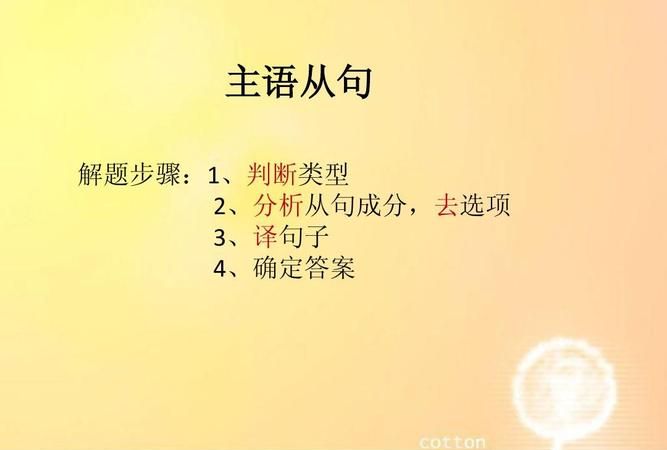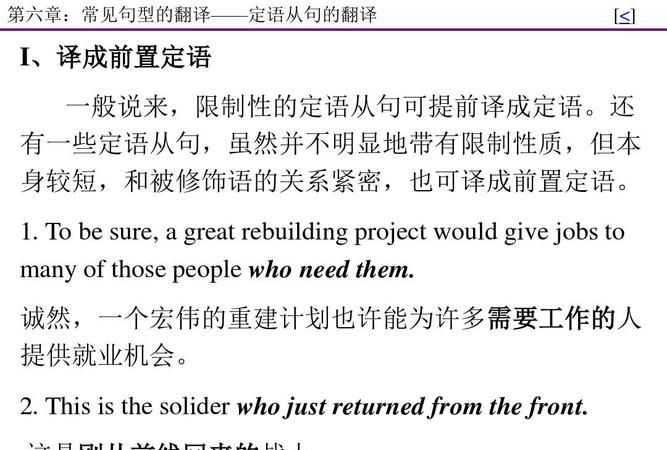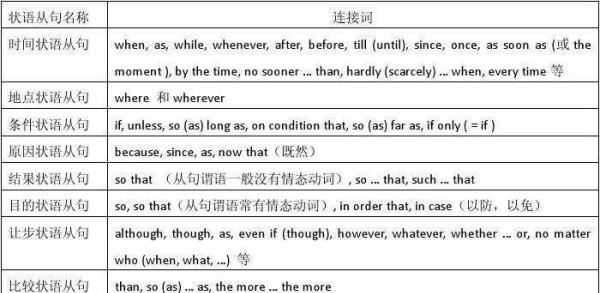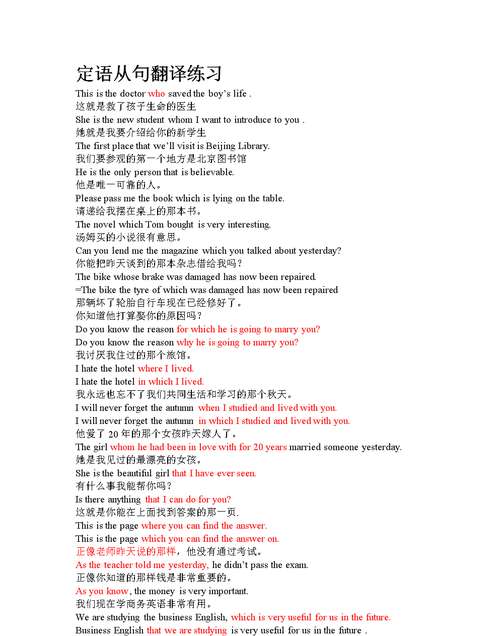本文目录
六大从句例句及翻译
状语从句:
While she spoke, the tears were running down. 她说话时,泪水直流。
The crops failed because the season was dry. 因为气候干旱,作物歉收。
It was better in case they were captured. 要是把他们捉到了,那就更好了。
名词性从句:
What he told me was only half-truth. 他告诉我的只是些半真半假的东西而已。
Can you hear what I say? 你听得到我所讲的吗?
We know the fact that bodies possess weight. 我们都知道物体具有重量这一事实。
形容词从句:
He who doesn’t study hard won’t pass the exam.不好好学习是不会通过这次考试的哈
Do you know the young woman (whom) Jim is talking with?你认识那位正与jim说着话的女士吗?
That is the only movie (that) I’d like to see.那是俺爱看的唯一一部电影。

时间状语从句的例题及答案解析
Adverbial Clauses
状语从句 1.分类
英语状语从句可表示时间、地点、条件、方式、让步、原因、比较、目的、结果等意义。不同的状语从句要求不同的连词或相当于连词的词组引出。以下是常用的引导状语从句的连词:
时间状语:when, while, as, before, after, since, until, the moment, as soon as
地点状语:where, wherever
条件状语:if, unless, as/so long as, suppose
方式状语:as, as if, as though
让步状语:though, although, even if, even though
原因状语:as, because, since, now that
比较状语:as...as, than, the...the, not so...as
目的状语:so that, in order that, for fear that, in case
结果状语:so that, so...that, such...that, that 2.时间状语从句
The street were less crowded when Mr.Budd let him out.
巴德先生让他出来的时候,街上行人已少了一些。
I'll come back as soon as is over.
一下课我就回来。
Please don't go anywhere before I come back.
我回来之前,哪儿也别去。
The telephone rang while I was having a bath.
我洗澡时,电话铃响了。 1)表示将来时间时,时间状语从句须用一般时态代替将来时态。
We will go fishing if it is fine tomorrow.
如果明天晴,我们就去钓鱼。
Soon after you jump, the parachute will open.
你一跳,降落伞就会打开。 2)when, while, as在引导时间状语从句时的区别:when表示从句的动作与主句的动作一个紧接着一个发生,也可表示从句动作在主句动作之前或之后发生。从时间上来说,它既可指一段时间,也可指某一具体时刻。
She opened the door when she heard the door bell.
她听到门铃响就把门打开了。
When he called, I was making lunch in the kitchen.
他来电话时,我正在厨房做午餐。
I used to eat in small restaurants when I was in London.
我在伦敦时,常在小饭馆吃饭。
I'll tell him about in when I see him.
我看到他时我会告诉他的。 while表示从句的动作与主句的动作同时发生,从句动作往往是有延续性的,因此从句所用的谓语动词往往是延续性的动词。从时间上来说,while指一段时间。
The light went out while I was reading the newspaper.
我正在读报时,灯灭了。
He repaired the leaking tab while the rest of the family were watching TV.
家里其他人在看电视的时候,他把漏水的龙头给修好了。
as表示某事发生的过程中另一件事发生了,亦可用来表示两个同时发生的动作。
As I drove past the crossroads, a red car suddenly shot right past me.
我开车过十字路口时,一辆红色的轿车突然从我旁边飞驰而过。
A look of surprise came into his eyes as he read the message.
他读着条子,眼里流露出吃惊的神情。
As he did so he nearly ran into a large man who suddenly came in through the doorway.
就在他这么做的时候,他几乎与一个突然进来大个子撞了个满怀。 3.地点状语从句
where, wherever引导地点状语,意思与in/at/to/the place where接近。
I'll drive you wherever you are going.
你去任何地方我都开车送你去。
You have the right to live where you want.
你有权住在你想住的地方。
It's your fault that she is where she is.
她落到今天这个地步是你的错。
Where there is a will, there is a way.
有志者事竟成。 4.原因状语从句
引导原因状语从句的连词主要有because, as, since。because表示的语气最强,通常用于回答以疑问词why引导的疑问句。as和since表示的原因通常对方是知道的,since较as正式。because可以代替as, since,但as和since不一定能代替because。
He failed the exam because he didn't study hard.
他考试不及格是因为他学习不努力。
He distrusted me because I was new.
因为我是新来的所以他不信任我。
As it is raining, you'd better take a taxi.
正在下雨,你最好乘出租车。
As all seats were full, he stood up and gave up his to an old lady.
由于所有的座位都有人了,他就站起来把他的座位让给了一位老太太。
Since you are going, I'll go, too.
既然你要去,那我也去。
Since you have no objection, let's get started.
既然你不反对,那就让我们干吧。 5.目的状语从句
She ate her supper quickly so she could go out early.
她很快吃晚饭以便能早点出来。
They drove with both windows closed so that he would not catch cold.
他们开车时把两边的窗子都关上了,这样他就不会感冒。
Speak clearly so that they will understand you.
说话清楚点好让他们明白你的意思。
These men risk their lives in order that we may live more safely.
这些人冒着生命危险是为了让我们更加安全地生活。
Don't let your baby play with your watch in case he damages it.
别让你的孩子玩你的表以免把表弄坏。
I'll buy some beer in case Uncle Tom drops in at the weekend.
我要去买些啤酒以备周末汤姆叔叔来。
目的状语从句中常用can/could, may/might, will/would, shall/should等情态动词。
He wore a pair of sunglasses for fear that he would/might be recognized.
为了不让人认出来,他戴了一副墨镜。 6.让步状语从句
Though we have worked with John for years, we don't know much about his family.
尽管我们和约翰一起工作多年,我们对他的家庭还是了解甚少。
Even though you don't like him, you should be polite.
尽管你不喜欢他,你还是应该礼貌一些。
Although we were poor, we were very happy.
尽管我们穷,但我们很快乐。
He is a good man even though I don't always agree with him.
尽管我们的看法有时不同,但他人是好的。
Even if he proves to be wrong, he wouldn't admit it.
即使已经证明他错了,他也不会承认。
as也可引导让步状语从句,但只用在形容词/副词+as+主语+谓语的结构中。这一结构主要用于正式文体,不用于非正式文体。
Patient as he was, he had intention of waiting for three hours.
尽管他很有耐心,但他还是不打算等三个小时。
Young as he is, she has five years of teaching behind her.
尽管她还年轻,但她已经有五年的教学经历了。
Hard as he tried, he couldn't cope with his responsibilities as manager.
尽管他很努力,但他实在不能胜任经理的职责。 7.方式状语从句
Do as you are told.
叫你怎么做你就怎么做。
I've changed the title of the essay as you suggested.
我已经照你所建议的那样把文章的题目改了。
She had never spoken so excitedly as she did then.
她说话从来也没有像那会儿那样激动过。
The other day he spoke about John as if he knew him.
前两天他谈起约翰,就好象他认识他似的。
I remember the whole thing as if it had happened yesterday.
整件事我都记得,仿佛它就发生在昨天。
He told us what had happened yesterday as if he had witnessed the whole thing.
他把昨天发生的事情都告诉了我们,就像是他亲眼目睹了一切似的。 8.结果状语从句
One of her lungs is affected a little so she has to rest.
他的一叶肺有点感染,所以她得休息。
I missed the bus so I didn't get home until very late in the evening.
我没赶上汽车,所以晚上很晚才到家。
His father works so late every day that he hardly ever sees him.
他父亲每天都工作到很晚,他几乎见不到他。
His heart beat so fast that he could hardly breathe.
他的心脏跳得那么快,他几乎不能呼吸了。
It gave him such a shock that his face turned white.
这使他大吃一惊,以至他的脸都白了。
What's the matter with you that you look so worried?
你看上去忧心忡忡的,出什么事了?

状语从句一般修饰什么
一、时间状语从句
用表示时间的连词连接一个句子作状语,这样的主从复合句就是时间状语从句。连接时间状语从句的连接词有:when, before, after, while, as soon as, until, since...... 这里要注意一点的是,如果主句是一般将来时,从句只能用一般现在时表示将来意义。
二、地点状语从句
地点状语从句表示地点、 方位, 这类从句通常由where、wherever等引导。地点状语从句可置于句首、句中或句尾。
三、原因状语从句
原因状语从句指在句中用来说明主句原因的从句。引导原因状语从句的从属连词有because(因为), as(由于), since(既然), now(that)(既然), when(既然), seeing (that) (由于,鉴于)。
四、条件状语从句
由引导词if或unless引导的状语从句叫做条件状语从句。在英文中,条件是指某一件事情实现之后(状语从句中的动作),其它事情(主句中的动作)才能发生,通常译作“假如”。
五、目的状语从句
目的状语从句:从句部分是用以补充说明主句中谓语动词发生的目的的状语从句。
表示目的状语的从句可以由that, so that, in order that, lest, for fear that, in case等词引导;目的状语从句的谓语常含有may, might, can, could, should, will, would等情态动词。
六、让步状语从句
让步状语从句,是指状语从句中的一种,其本身也是状语从句。一般翻译为“尽管……”或“即使……”,就是我们日常生活中用的“退一步说…”的感觉。
七、比较状语从句
状语从句指句子用作状语时,起副词作用的句子。比较状语从句是其中的一种,主要运用于形容词和副词的原级、比较级及最高级的句子之中。
八、方式状语从句
1、由as, (just) as…so…引导的方式状语从句通常位于主句后,但在(just) as…so…结构中位于句首,这时as从句带有比喻的含义,意思是"正如…","就像",多用于正式文体。
2、由as if 和as though 引导的从句中的时态取决于说话者对所谈内容的态度。若说话者认为其看法是真的或可能会成为事实,从句谓语就按常规变化。
九、结果状语从句
结果状语从句其规律由so与such的不同词性决定。such 是形容词,修饰名词或名词词组,so 是副词,只能修饰形容词或副词。 so 还可与表示数量的形容词many, few, much, little连用,形成固定搭配。
结果状语从句的从句部分是补充说明主句中谓语动词发生的结果的,通常位于主句之后。结果从句中通常不用情态助动词,但must,can,could除外。such用在(形容词)名词之前;而so要用在形容词/副词之前,so或that有时会省略掉。

扩展资料:
1,时间状语从句
When I came into the room,he was writing a letter.
当我进屋时,他正在写信。
2、地点状语从句
Where there is a will,there is a way.
有志者,事竟成。
3、原因状语从句
I came back late yesterday because I was on duty.
昨天我回来晚了,是因为我要值班。
4、目的状语从句
We'll tell you the truth so that you can judge for yourself.
我吧真实情况告诉你,使你自己能做出判断。
5、结果状语从句
It is such an interesting novel that all of us want to read it.
这本书很有趣,大家都想看。
6、条件状语从句
We shall go there tomorrow if it doesn't rain.
如果明天不下雨,我们就去哪儿。
7、方式状语从句
Do as you are told.
按照人家告诉你做的去做。
8、让步状语从句
I'll go even though it rains tomorrow.
即使明天下雨,我也要去。
9、比较状语从句
He bought fewer books than I (did).
她买的书比我买得少。
参考资料:百度百科-状语从句
英语从句例句200句带翻译
I'll tell you about it when we meet .我们见面时,我会告诉你有关情况的。
As he was carrying out the experiment , he found something abnormal .正当他在做试验时,他发现情况有些不常。
Please eat it while it is hot .请趁热吃。
It has been more than two years since we parted last time .
自我们上次分手至今已有两年多了。
Tom will tell him the truth when he comes back .
他回来时,汤姆会告诉他事实真相的。
He will not play football if it rains tomorrow .
明天要是下雨,他就不踢足球了。
Tom would tell him the truth when he came back .
他回来时,汤姆会告诉他事实真相的。
He would not play football if it rained the next day .
次日要是下雨,他就不踢足球了
While she was watching TV , she was cracking seeds .
她一边看电视一边磕瓜子。
As he was doing his packing , some of his friends came to say good-bye to him .正当他在收拾行装的时候,他的一些朋友来向他告别。
They were ready to go out when the telephone rang .(这个句子表示主句谓语动作rang发生的突然性。按常规应该是:When they were ready to go out , the telephone rang .)就在他们准备出去的时候,电话铃响了。
He didn't go to sleep until 12 last night .
他昨晚直到十二点钟才睡觉。
They didn't realize their fault till we pointed it out to them .
直到我们向他们指出了他们的错误,他们才意识到。
Not until we pointed out their fault to them did they realize it .
直到我们向他们指出了他们的错误,他们才意识到。
The students made much noise till the teacher came into the classroom .
直到老师走进教室学生们才停止了大声喧哗。
The young couple were very happy until they used up all their money .
那对年青夫妇直到花光了所有的钱才沮丧起来。
I may not come to see you recently unless I can complete the project ahead of time .除非我能提前完成那个项目,否则我最近不会来看你了。或者:除非我能提前完成那个项目,我最近才会来看你了。
We can surely attain our goal as long as we are united as one .
只要我们团结成一个人,我们肯定能实现我们的目标。
What shall we do if we can not get the necessary data?
如果我们弄不到必要的数据,我们怎么办?
They promised to let us have a meeting in their office on condition (that) we could keep it clean . 如果我们能保持清洁,他们答应让我们在他们的办公室里开会。
He can't deliver his lectures today because he has got a bad cold .
他今天不能去讲课了,因为他患了重感冒。
I may not be able to attend your wedding party not because I'm not willing to but because I've been caught by something recently.
我或许无法参加你的婚礼了,不是我不想去而是近来有些事情缠着我无法脱身。
I won't dwelt too much time on this matter as it is known to everybody.
由于大家都知道这件事,我就不在这件事上多花时间了。
Since you are busy enough we won't trouble you any more .
既然你们忙得够呛,我们就不再麻烦你们了。
Because it is raining heavily, we have to change our plan to go outing.现在下着这么大的雨,我们不得不改变去郊游的计划。
As the weather was fine, we decided to climb up the mountain.
由于天气晴朗,我们决定去登山。
She is loved by all for she is kind and pretty .
由于她长得漂亮、人又好而深受大家喜欢。
Air exists everywhere although we can't see it.
尽管我们看不见空气,但它却无处不存在。
No matter where you go on the earth, you will feel the gravity.
无论你走到地球的什么地方,你都会感觉到地引力。
We'll start our meeting on time whether he comes or not.
无论他来不来,我们将准时开会。
Even if we are approaching the end of the experiment, we still have no time to lose.即使我们即将完成试验,我们依然要分秒必
Although he is old, he is still energetic .(主从复合句,正确)
尽管他上了年纪却还是依然精力充沛
He is old but (he is) still energetic . (并列句,正确)
尽管他上了年纪却还是依然精力充沛
He speaks English almost as a native speaker does .
他的英文几乎说得如讲英语母语的人一样。
He speaks English as if he were a native speaker .
他讲英文的样子似乎象说英语母语的人。
She looked unwell as though she got a bad cold .
她看上去身体不适好像患有重感冒。
In this reading-room you can read anything as everyone does here .
在这间阅览室里,你可以象这儿的每个人一样想看什么就看什么。

以上就是关于各种从句举例并解析翻译 ,六大从句例句及翻译的全部内容,以及各种从句举例并解析翻译 的相关内容,希望能够帮到您。
